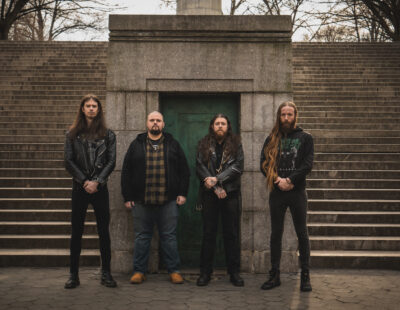Metal musicians quote Nietzsche far too much, almost as much as they quote H.P. Lovecraft. Sometimes it’s for blatant and misdirected political purposes; other times, to add a veneer of intellectual heft to mediocre material. But when you consider the short life of musician Selim Lemouchi, one of the German thinker’s best known quotes resonates: “If you gaze into the abyss too long, the abyss gazes also into you.”
The abyss was, perhaps unsurprisingly, the place where Lemouchi seemed comfortable. His music is rife with references to death, liberation from the flesh, serenity in chaos. Like many musicians I’ve talked to my exchange with him before Christmas two years ago was fascinating and cordial, but my relationship ended after a one-hour phone call. Still, it’s a call I won’t forget. Lemouchi had already dealt with so much at an age where most people are starting their lives: failed early bands, depression, hospitalization and a stubborn vision. He was candid about what he’d been through. But he was adamant that he knew where he wanted to go and what he wanted to leave behind.
Lemouchi’s ability to move past those things — at least initially — resulted in a collection of albums that helped restore grandeur and songwriting to a metal scene badly in need of craftsmen. Lemouchi’s work demanded emotional investment: it was music for the flesh, driven by almost incalculable emotion, the sort of thing the Romantic poets courted in the late 1700s.
Lemouchi was rewarded with both critical acclaim and a modicum of success in the musical world. Yet he seemed, at least in conversation, impatient for the next act: “When we have cast away all ties to our flesh and egos,the logical next step in that initiation would be death. I hope to obtain the clarity and oneness that’s unavailable to us in our existence.”
What’s often lost in discussion of The Devil’s Blood is how conservative they were in some respects. They were a brother-sister team with an obvious bond that wrote music that’s not family friendly. The reason the music worked is because they did it together. Lemouchi didn’t have to look far to find a mouthpiece; he looked to the person he grew up with to crystallize a vision that was very much of its time, yet beyond it.
Lemouchi will be best remembered by his work in The Devil’s Blood. His songs and approach were unquestionably dark, yet it was darkness with moments of grandeur and even joy – just listen to “On The Wings Of Gloria,” which hints at escape and departure. Lemouchi was able to find beauty in the darkness, like in the radio friendly splendor of “The Thousandfold Epicentre,” in which his sister sings “I am nothing/I am no thing. I am not incessantly.”
Lemouchi stared too long into the abyss and came back and left us a record of what he saw. For that, we should be thankful. Rest easy, Selim.






